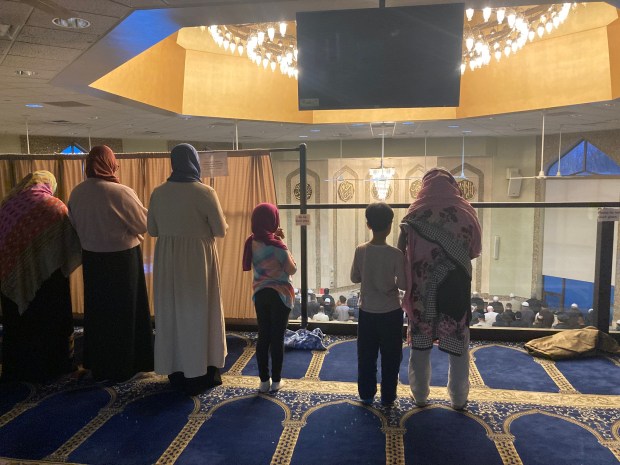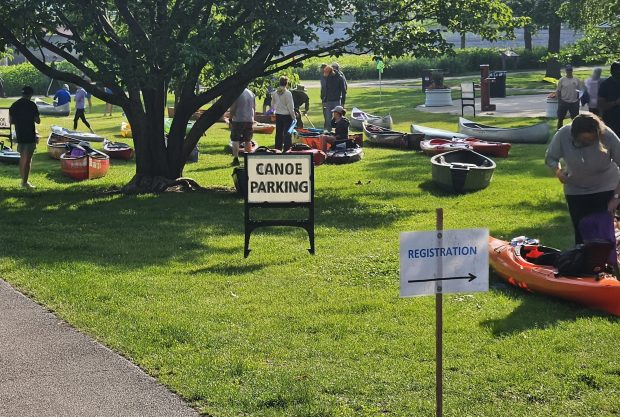Though she is only 6, Noor Khurram of Morton Grove has a clear understanding of her purpose during Ramadan this year, as a result of the war in Gaza.
“We should do prayer for the people in Palestine because of what’s happening to them,” she said.
Her older sister Menaal, 14, also is aware of the suffering of those in Gaza and is focused on prayer during a month when her family and other Muslims focus on spirituality and good works.
“Many people died trying to get to this blessed month,” she said.
The Khurram girls’ family of five gathered in their home on Monday to finish decorations and prepare for the month-long celebration of daytime fasting and service, but were well aware of the conflict overseas.
“There is a lot of pain for a lot of innocent people dying,” said Sana Ali, the girls’ mother. “There is a lot of sadness. I will take the opportunity during Ramadan to make more prayers and hope there is a brighter future for them.”
The war, triggered by Hamas’ Oct. 7 attack on Israel, has killed more than 30,000 Palestinians and driven most of Gaza’s 2.3 million people from their homes, per the Associated Press. A quarter of Gaza’s population is starving, according to the United Nations, because they cannot find enough food or afford it at vastly inflated prices.
At the mosque the family attends in Morton Grove, one of three facilities run by the Muslim Community Center, the mood was similar.
Sa’ad Quadri, one of four imams and religious director of the MCC, said he often experiences anxiety during Ramadan because he suffers from depression, but this year is especially hard.
“Ramadan is a festive time, but it’s very difficult to be festive when you have such a heavy heart,” Quadri said. “Families love to cook special meals and we’re seeing images of children starving. You can’t enjoy it. People are trying to reconcile having a joyous and festive time when people overseas can’t.”
Usually, Ramadan is an opportunity to serve God in ways and at a level many Muslims do not practice throughout the rest of the year, he said.
“We’re incited to do good,” Quadri said. “Community service is going through the roof. People are spending money like never before just to serve humanity. People find a niche to increase their service to Allah. They’re trying to do what should be the norm and re-establish the norm.”
Muslims must resist the temptation to wallow in sadness and move forward in their Ramadan celebrations, he said.
“If we allow ourselves to be debilitated by grief, we’re not helping anyone,” Quadri said. “It’s better to ask God to relieve us of it than remain inactive.”
Masood Bijapuri, president of the MCC, said Ramadan is a “very special time where everything – work or other stuff – comes second.”
“We try to focus our time on religious practice,” Bijapuri said. “Fasting causes restrictions. Families get together in the evening when they break the fast, and in the morning. Everybody is so busy during regular months, whereas in Ramadan everyone comes together.”
For Bijapuri, this year’s celebration is “very, very sad and very painful.” In response to the conflict in Gaza, MCC is collecting resources for the people there.
“We try to do whatever we can,” he said. “We’re collecting funds for medicine, food, everything we can. We provide as much help as we can.”
Under the practice of zakat, Muslims are asked to contribute 2.5 percent of their wealth to the poor, Bijapuri said. This year many of those funds are going to Gaza.
“It’s just not the same as every year,” he said. “This year is very, very tough. People are suffering in different parts of the world. We are fortunate to get a meal. But this is not the same as other Ramadans in the past – not just for me, but for the entire community.”
Yousif Marei of Chicago, a Palestinian-Jordanian-American member of MCC, said Ramadan in Islam’s holy land is “under attack this year.”
Marei, who came to the United States in 1979, has relatives who live in Jenin, a town in the West Bank, he said. They have less food available than usual, but have not been injured or killed.
“It’s very painful. There is extreme hardship to civilians and worshippers,” Marei said. “There is no description to my feelings because my family is still there.
Referring to reports that one in four people in Gaza faces starvation due to food and water that is not being allowed into Gaza, as reported by the Associated Press and other news sources, he said, “Ramadan came before Ramadan for them because there is fasting – no food and no water.”
According to the Associated Press, Israel says it places no limits on the entry of humanitarian aid through the two functioning land crossings in the south. But U.N. agencies and humanitarian groups say they cannot always distribute aid once it enters because of security and logistics issues. They have called on Israel to open more crossings.





